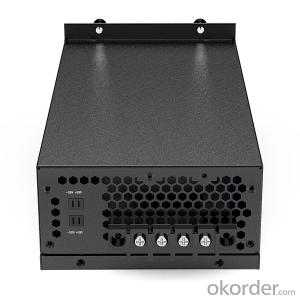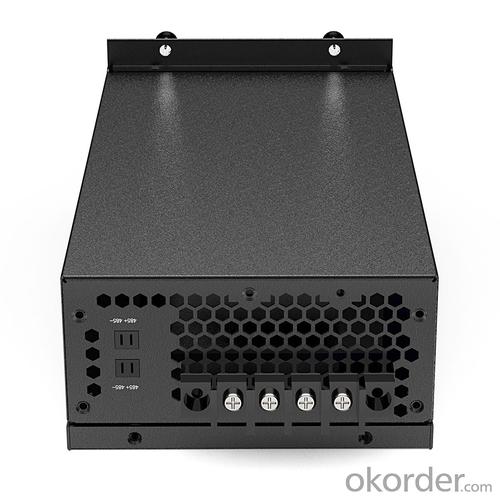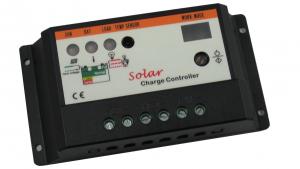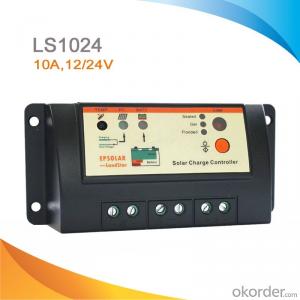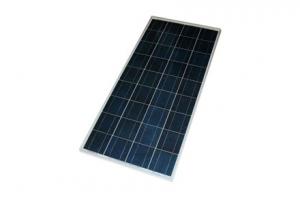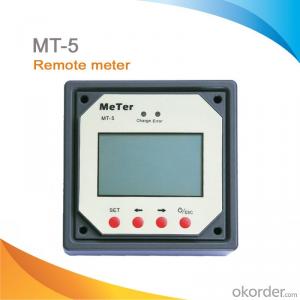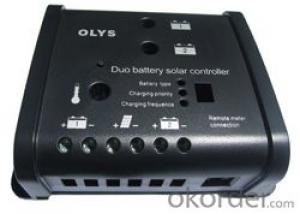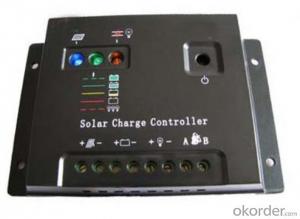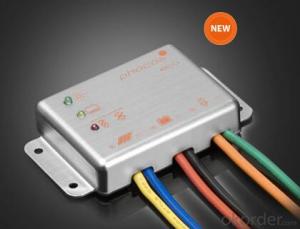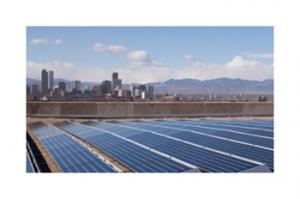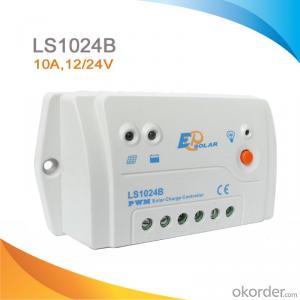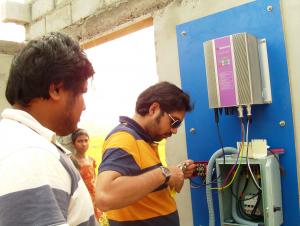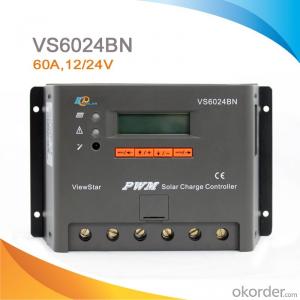MF Series Solar Pool Controllers Suitable for Electric Cabinet
- Loading Port:
- China main port
- Payment Terms:
- TT OR LC
- Min Order Qty:
- 100 pc
- Supply Capability:
- 500 pc/month
OKorder Service Pledge
OKorder Financial Service
You Might Also Like
1. Product Characterist
1.1 Professional design of system reliability overall improvement
Semiconductor device adopt IR、TI、ST、ON and NXP etc. international well-know brands
Industrial grade MCU all digital technology, high capacity of resisiting disturbance, No aging and drifting problem
IP protection grade,no any buttons,improve the waterproof reliability furtherly
1.2 High efficiency MPPT tracking technology
MPPT tracking effiency ≥99.9%, system generation efficiency up to 98%, promote the system efficiency and save the system cost.
1.3 High conversion effiency
Charging conversion efficiency up to 98.8%
1.4 Super tiny static power consumption
No-load current consumption ≤ 35mA(24V system),≤24mA(48Vsystem)
1.5 Inteligient storage battery management
Three phase charging management, MPPT charging, constant voltage charge and float charge, significantly extends the battery life
Base on intelligent temperature compensation charge and discharge management, significantly extend more than 50% battery life
1.6 Flexible parameter setup funtion
RS485 communication,can set parameter flexiblely, various batteries compatibility
1.7 Compete protection funtion
Battery reverse protection
Solar panel reverse proction
Prevent the battery from discharging to solar panel at night
Battery low voltage protection
Battery exits low voltage protection
Output overcurrent protection
2.Product parameter
Item | Content | Model |
Unit
|
M4850 | |||
Battery Parameter | Rated system voltage | Lithium battery program setting, lead acid 24V/48V Auto | - |
Maximum charging current | 50 | A | |
Support maximum number of parallel units | 20 | Pieces | |
Charging voltage range | 20~60 | V | |
MPPT charging voltage @25°C | ≤28.8(24V), ≤57.6(48V) | V | |
Constant voltage average charging pressure @25°C | 28.8(24V), 57.6(48V) | V | |
Constant voltage floating charge @25°C | 27.6(24V), 55.2(48V) | V | |
Temperature compensation coefficient | -4mV/℃/2V | - | |
PV Parameter | PV maximum input voltage | 180 | V |
Maximum solar panel power | 1200(24V) 2400(48V) | W | |
Maximum DC input current | 10*2 | A | |
Starting voltage | 40(24V),70(48V) | V | |
MPPT tracking range | 40≤Vp≤150(24V), 70≤Vp≤150(48V)。 | V | |
System parameter | MPPT efficiency | ≥99.9% | - |
Charge conversion maximum efficiency | 98.8% | - | |
Static power consumption | ≤35(24V)≤24(48V) | mA | |
Conmunication method | RS485 | - | |
Storage/working temperature | -25~60 | ℃ | |
Storage/working humidity | 0~95%(no condensation) | RH | |
altitude | 3000 | m | |
Protection level | IP20 | - | |
Heat dissipation method | Intelligent air cooling | - | |
Certification | CE,ROSH | - | |
Size (mm) | 135*245*83 | mm |
3. Image
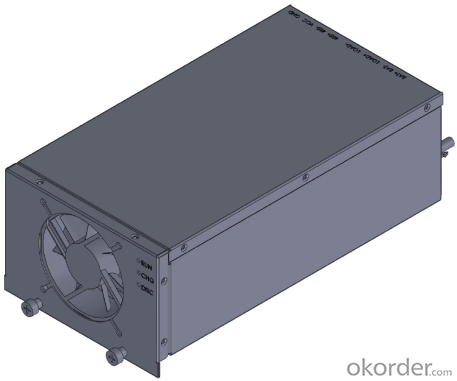
4. FAQ
Q:DO YOU HAVE ANY CERTIFICATION FOR YOUR PRODUCTS?
A:We have ISO9001:2015,CE、RoHS certifications for all of our products.
Q:DO YOU HAVE MOQ FOR PLACE ORDER?
A:Low MOQ,1pe for sample checking is available
- Q: Do solar controllers require regular maintenance?
- Yes, solar controllers do require regular maintenance. This typically involves checking the connections, cleaning any debris or dust, inspecting the wiring, and ensuring proper functioning of the controller. Regular maintenance helps to optimize performance and prolong the lifespan of the solar controller.
- Q: Can a solar controller be used with solar panels of different brands?
- Yes, a solar controller can be used with solar panels of different brands as long as they have compatible specifications and voltage ratings. The solar controller's function is to regulate the charging of batteries or the power output from the solar panels, regardless of the brand. However, it is recommended to ensure compatibility and consult the manufacturer's guidelines for optimal performance.
- Q: How does a solar controller handle variations in solar panel soiling?
- A solar controller does not directly handle variations in solar panel soiling. Its main function is to regulate and optimize the flow of energy between the solar panels and the battery storage system. However, solar controllers indirectly help with mitigating the impact of panel soiling by ensuring that the solar panels are operating at their maximum efficiency. By monitoring the voltage and current output of the panels, the controller can detect any decrease in performance due to soiling and adjust the charging parameters accordingly to maintain optimal charging levels.
- Q: Can a solar controller be used with different types of batteries (e.g., lead-acid, lithium-ion)?
- Yes, a solar controller can be used with different types of batteries including lead-acid and lithium-ion. However, it is important to ensure that the solar controller is compatible with the specific type of battery being used in order to optimize charging and prevent damage to the battery.
- Q: Can a solar controller be used in a solar-powered telecommunications system?
- Yes, a solar controller can be used in a solar-powered telecommunications system. A solar controller regulates and manages the flow of electricity from the solar panels to the batteries, ensuring the batteries are charged efficiently and preventing overcharging or damage. This is crucial in a solar-powered telecommunications system as it helps maintain a stable power supply and prolongs the lifespan of the batteries, ultimately improving the system's overall performance and reliability.
- Q: How does a solar controller protect against lightning strikes?
- A solar controller typically includes surge protection devices that help divert the high voltage caused by a lightning strike away from the solar system. These devices act as a pathway for the excess energy to ground, preventing it from damaging the solar panels, inverters, or other components of the system.
- Q: What is the maximum voltage that a solar controller can handle?
- The maximum voltage that a solar controller can handle varies depending on the specific model and brand. However, in general, most solar controllers can handle voltages up to 150 volts DC.
- Q: Can a solar controller be used with solar-powered indoor government buildings?
- Yes, a solar controller can be used with solar-powered indoor government buildings. A solar controller, also known as a charge controller, is an essential component of a solar power system. Its primary function is to regulate the flow of electricity between the solar panels and the batteries, ensuring that the batteries are charged efficiently and preventing overcharging or damage to the batteries. Solar-powered indoor government buildings typically utilize solar panels to generate electricity from sunlight. This electricity is then used to power various devices and systems within the building. In such cases, a solar controller is necessary to manage the charging process of the batteries that store the solar energy. By connecting the solar panels to the solar controller and then to the batteries, the solar controller can accurately monitor and control the charging process, maximizing the efficiency and lifespan of the batteries. Additionally, solar controllers often provide other useful functionalities, such as temperature compensation, load control, and battery protection. These features are particularly important for indoor government buildings, as they help optimize the performance of the solar power system and ensure reliable and sustainable power supply. Therefore, it is highly recommended to use a solar controller in conjunction with solar-powered indoor government buildings to ensure efficient and safe operation of the solar power system.
- Q: Can a solar controller be used for battery charging in remote locations?
- Yes, a solar controller can be used for battery charging in remote locations. Solar controllers regulate the voltage and current from solar panels to ensure efficient charging of batteries. They are designed to work in off-grid and remote locations by managing the flow of power from solar panels to batteries, preventing overcharging and protecting the batteries from damage.
- Q: Can a solar controller be used in a hybrid solar panel system?
- Yes, a solar controller can be used in a hybrid solar panel system. A solar controller, also known as a charge controller, is responsible for regulating the voltage and current from the solar panels to the batteries or grid. In a hybrid solar panel system, which combines both solar and other energy sources like wind or grid electricity, a solar controller is still necessary to manage the charge from the solar panels. It helps ensure that the batteries are properly charged and protected from overcharging or excessive discharging. Additionally, a solar controller can also monitor and optimize the energy flow between the different energy sources in a hybrid system, maximizing the efficiency and utilization of the solar power generated.
Send your message to us
MF Series Solar Pool Controllers Suitable for Electric Cabinet
- Loading Port:
- China main port
- Payment Terms:
- TT OR LC
- Min Order Qty:
- 100 pc
- Supply Capability:
- 500 pc/month
OKorder Service Pledge
OKorder Financial Service
Similar products
Hot products
Hot Searches
Related keywords
